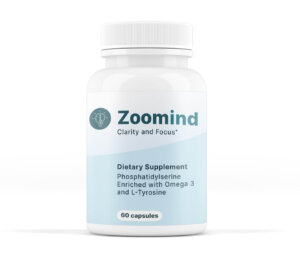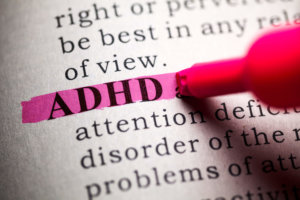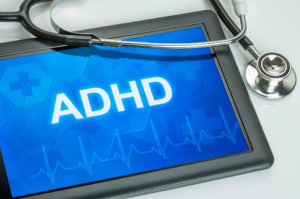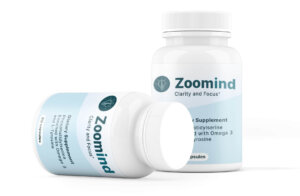What is Zoomind?
Zoomind is a dietary supplement, in capsule form, that delivers phosphatidylserine, L-Tyrosine, and Omega-3. Zoomind was formulated to promote clarity and focus and support symptoms of ADHD in adults and children. Zoomind is an over-the-counter dietary supplement that provides two of the most important types of polyunsaturated fatty acids (PUFAs), Eicosapentaenoic acid (EPA) and docosahexaenoic acid (DHA), which can be highly beneficial in the treatment of ADHD. Zoomind contains phosphatidylserine-omega-3 enriched with EPA, which has been clinically shown to safely and effectively manage ADHD and improve quality of life.
 For many years up until 2018, Enzymotec, a pharmaceutical company based in Israel, produced an oral medication known as Vayarin. It was relied upon by many families all over the world with children affected by ADHD as an effective treatment that brought real relief with almost no negative side effects. It managed to treat and help manage lipid dietary imbalances that are associated with ADHD.
For many years up until 2018, Enzymotec, a pharmaceutical company based in Israel, produced an oral medication known as Vayarin. It was relied upon by many families all over the world with children affected by ADHD as an effective treatment that brought real relief with almost no negative side effects. It managed to treat and help manage lipid dietary imbalances that are associated with ADHD.
Is Zoomind the Same as Vayarin?
Not exactly. But it’s based on a similar approach. In 2017 the company that marketed Vayarin was sold to Frutarom, another large drug manufacturer, which chose to use the factories that were making Vayarin for other purposes; in 2018, Vayarin was withdrawn from the market. Many people were distressed that this effective medication was no longer available, and in its place, the generic drug manufacturer Teva launched Zoom, which is the same medication as Vayarin with almost exactly the same ingredients and formulation, administered the same way.
Like Vayarin before it, Zoom was a clinically tested dietary supplement that brings various vital nutrients that the body needs to function optimally, mainly the omega-3 fatty acids that are so beneficial to the alleviation of ADHD. Both were found to have minimal known side effects or drug interactions. Both products made it easy to add to the daily diet of a child with ADHD.
And then Zoom, along with Vayarin went off the market as well.
That’s why we created Zoomind; a dietary supplement designed to boost the intake of essential proteins beneficial for children and adults with Attention-Deficit/Hyperactivity Disorder (ADHD).
What is, and Who Suffers from ADHD?
Attention Deficit Hyperactivity Disorder (ADHD) is one of the most common neurodevelopmental conditions in children that causes a range of disruptive and hyperactive behaviors. ADHD sometimes manifests itself in two distinct types of behavioral problems – either inattentiveness, or hyperactivity / impulsiveness, but most frequently, people with this disorder show both forms to some extent.
The symptoms usually become first noticeable in children around the age of 6, just as they start school, although they may have been manifest at home before then. However, there is no clear boundary age at which the problems become noticeable.
The primary elements of inattentiveness are being quickly distracted and losing focus easily; making careless errors; appearing forgetful; losing things; being inclined to give up on tasks that are felt to be tedious or time-consuming; appearing to be unable to carry out instructions; constantly switching attention between tasks and having difficulty prioritizing them.
The main elements of hyperactivity and impulsiveness are seen in people who are unable to remain still and quiet; constantly fidgeting and with excessive physical movement; lack the ability to concentrate on tasks; talk excessively; are unwilling to wait their turn; act without thinking; interrupting other people’s conversations and lacking a sense of danger.
Even in the less severe instances, ADHD can result in a lack of discipline, weaker achievement at school, poor interaction with other children and adults, and other general social and behavioral problems. In severe cases, it can cause significant problems, even threatening a child’s safety.
It is important not to apply a categorization too casually for any child who has trouble focusing on a task for long or has sustained high levels of activity. Most people are occasionally inattentive, hyperactive or impulsive. Children should not be regarded as having ADHD just because they’re different from their family or friends.
The important distinction between typical childhood behaviors and those of people with ADHD is that the disorder consistently and repeatedly disrupts daily life and relationships. ADHD doesn’t show up in only one environment. A child that has significant problems at school but is fine at home — or the other way around — likely has something other than ADHD as the cause. Two other key characteristics of ADHD are that the behaviors last for more than six months and begin when they are young – typically before age 12.
Is There a Prevalence of ADHD among Children, Teenagers and Young Adults?
There are some indications of heritability or environment influencing the incidence of the disorder – children who have a parent or an older sibling with ADHD tend to have a higher risk of developing ADHD. Those who experienced complex medical conditions early in life or were born prematurely also tend to develop ADHD more frequently than others.
In 2018, a scientific study published in the Journal of Clinical Child & Adolescent Psychology estimated the national prevalence of parent-reported ADHD diagnosis and treatment among U.S. children between 2 and 17 years of age. It included indicators of a diagnosis at some point of ADHD by a healthcare provider, whether the child currently had ADHD, as well as receipt of medication and behavioral treatment for the condition. The report shows that in 2016, an estimated 6.1 million U.S. children (9.4% of the total population in this age grouping) had at some point been diagnosed as suffering from ADHD. Of these, 5.4 million – almost nine out of ten – were still suffering at the time of the survey. Of these children, 62% were taking medication, and nearly half had received behavioral treatment for ADHD sometime in the year just past.
 What is the Impact of ADHD on a Child’s Life?
What is the Impact of ADHD on a Child’s Life?
ADHD can make life difficult both for the child and for family and neighbors. Children with ADHD tend to have poor self-esteem and so have trouble interacting with and being accepted by peers and adults. He or she may fail to think before acting, to the point that it raises safety concerns.
In later years, they are at increased risk of alcohol and drug abuse and other delinquent behavior.
Do we know what causes ADHD?
The causes of ADHD are not yet totally understood, but it is believed to be a combination of factors, including genetics, the structure of the person’s brain, and, most significantly, children with ADHD may have a chemical imbalance in the levels of neurotransmitters or how they function. Some groups are especially vulnerable, such as premature births, children who have epilepsy, and those whose brains did not develop fully in the womb.
One of the most important causes, which is often missed, is dietary deficiencies. One study showed that dietary supplementation with EPA (eicosapentaenoic acid) and DHA (docosahexaenoic acid) appears to alleviate ADHD-related symptoms in at least some children, indicating that ADHD can result from a deficiency in omega-3 fatty acids due either to a lack of dietary sources or a problem in the metabolic production of its essential parts. Another survey of 16 randomized studies of the benefits of omega-3 dietary supplements showed that 13 reported favorable benefits on ADHD symptoms, including improvements in hyperactivity, impulsivity, attention, visual learning, word reading, and working/short-term memory.
Omega-3 fatty acids are substances that the body needs for a wide variety of functions, from muscle activity to cell growth. However, a child’s body cannot produce omega-3 fatty acids on its own. It brings them in through the food they eat where the best natural sources for omega-3 fatty acids are cold-water fish like salmon, trout and mackerel, and different shellfish and mussels.
How do Children with ADHD Benefit from Zoomind?
Omega-3 fatty acids are a prime source of the chemical compounds that the body requires to produce dopamine. Ideally, a child’s diet should be rich in suitable oils that his or her body can use to produce omega-3 fatty acids. For many years, nutritionists have said that the oils contained in cold-water fish like salmon, sardines, and tuna are the best natural source, loaded with the correct type of omega-3-rich sources. However, since it is not always possible for children to eat sufficient quantities of these fish, taking a simple dietary supplement with all the essential omega-3 fatty acids, in the right proportions, is a great alternative.
How does Zoomind Work?
The American Psychiatric Association recommends that every diet (kids and adults) should include fatty fish, like salmon and tuna — two or more times a week. They also recommend that people with “impulse control disorders,” like attention deficit hyperactivity disorder (ADHD), supplement their daily diets with at least 1 gram of fish oil. The reason: Omega-3 fatty acids help brains function better.
Omega-3 deficiencies are often associated with ADHD in children. Zoomind is rich in omega-3 fatty acids and phosphatidylserine both associated with boosting brain power.
Zoomind provides a pure source of essential fatty acids that the body needs for a wide variety of functions. Just about every aspect of neurotransmission — the movement of information from brain cell to brain cell — is affected by omega-3s. Our bodies can’t produce omega-3 fatty acids on its own. Zoomind is specially designed to boost the volume of omega-3 fatty acids in the body.
FAQ
What are the most frequently prescribed medications for ADHD?
The most frequent treatments prescribed are stimulant medications that appear to promote a balance in brain activity by boosting levels of neurotransmitters – chemicals that facilitate the passage of signals around the brain. The psychostimulants that are the most commonly prescribed medications include amphetamines (Dexedrine, Adderall XR, Mydayis and Vyvanse); methylphenidates (Concerta, Ritalin etc.) and dexmethylphenidate (Focalin).
A significant concern about stimulants is the risk of abuse and addiction both for the person with ADHD and in case of other people misusing or abusing the stimulant medication. Children should not be in charge of their own medicines. An overdose of stimulant drugs is serious and potentially fatal.
Antidepressant medications may be effective in treating ADHD, including atomoxetine (Strattera), bupropion (Wellbutrin SR, Wellbutrin XL and others), guanfacine (Intuniv), clonidine (Catapres, Kapvay). Antidepressants are generally prescribed if there are contra-indications for stimulants because of health problems or side effects. One concern is that children taking non-stimulants or antidepressants may run a slightly increased risk of suicide, but as yet, this remains unproven.
Does ADHD Persist into Adult Life?
Although symptoms of ADHD generally wane as a person ages, there is still some persistence of behaviors typical of ADHD in more than 60% of children throughout their lives. If you want to learn more, read our in-depth articles on the need for life-long medication and also on how ADHD medication affects adults.
Are There Any Side-Effects from Zoomind?
Generally, dietary supplements like Zoomind provide very gentle effects and have few, if any, negative effects. In the short term, it is usual to slowly introduce Zoomind into your child’s diet and to adjust the dosage with the help of your healthcare providers and pharmacist until any side effects are eliminated.
By comparison, alternative stimulant medications have several possible mild-to-severe side effects. You can read more about the long-term effects of ADHD medication here.


 What is the Impact of ADHD on a Child’s Life?
What is the Impact of ADHD on a Child’s Life?















